See Page 1 |
2 |
3 |
4 | of the July 2024 homepage archives. Wednesday the 7th
 According to common advertisements seen
in electronics and mechanics type magazines in the 1940s, '50s, '60s, the two best
ways to get the woman of your dreams is by ordering a Charles Atlas body building
course, or, at least according to these
Precision Apparatus Company promos, becoming an electronics technician. Whether
it be Hogarth in a World War II Echophone ad or Pete in this Precision Apparatus
Company ad, it seems techies get the girls. It appeared in a 1962 issue of Radio-Electronics
magazine. I don't know at what point nerds began being shunned by the babes rather
than being wowed by them. Here's another Precision Apparatus Company advertisement
asserting the same message. Maybe at some point the tables will turn again... According to common advertisements seen
in electronics and mechanics type magazines in the 1940s, '50s, '60s, the two best
ways to get the woman of your dreams is by ordering a Charles Atlas body building
course, or, at least according to these
Precision Apparatus Company promos, becoming an electronics technician. Whether
it be Hogarth in a World War II Echophone ad or Pete in this Precision Apparatus
Company ad, it seems techies get the girls. It appeared in a 1962 issue of Radio-Electronics
magazine. I don't know at what point nerds began being shunned by the babes rather
than being wowed by them. Here's another Precision Apparatus Company advertisement
asserting the same message. Maybe at some point the tables will turn again...
 Here is another in a collection of articles
on printed circuit board technology that appeared in the October 1969 edition of
Electronics World magazine. Amphenol has been making and driving the evolution
of electrical cable, sockets, and connectors since 1932. I have seen their advertisements
in many of my vintage electronics magazines, including this one that appeared in
these Radio News issues from January and October 1945. A lot of the innovation
was driven by military and aerospace quality, reliability, pin density, and weight
requirements, and as is always the case, a lot of the benefit redounded to the commercial
realm as well. Many of the
connector types appearing in this article were still being used during the years
I worked in the defense electronics business. During my time as... Here is another in a collection of articles
on printed circuit board technology that appeared in the October 1969 edition of
Electronics World magazine. Amphenol has been making and driving the evolution
of electrical cable, sockets, and connectors since 1932. I have seen their advertisements
in many of my vintage electronics magazines, including this one that appeared in
these Radio News issues from January and October 1945. A lot of the innovation
was driven by military and aerospace quality, reliability, pin density, and weight
requirements, and as is always the case, a lot of the benefit redounded to the commercial
realm as well. Many of the
connector types appearing in this article were still being used during the years
I worked in the defense electronics business. During my time as...
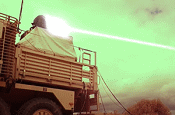 "UK scientists and engineers have successfully
fired a
high powered laser energy weapon from a British Army combat vehicle for the
first time. The ground-breaking test was conducted at Dstl's (Defence Science and
Technology Laboratory) range in Porton Down. The laser weapon neutralised targets
at distances in excess of 1km. As part of MoD's Land Laser Directed Energy Weapon
(LDEW) Demonstrator programme, the laser was mounted on a British Army Wolfhound
armoured vehicle for the tests. The technology is intended to be a low-cost, precise
and powerful defence against aerial threats, such as drones..." "UK scientists and engineers have successfully
fired a
high powered laser energy weapon from a British Army combat vehicle for the
first time. The ground-breaking test was conducted at Dstl's (Defence Science and
Technology Laboratory) range in Porton Down. The laser weapon neutralised targets
at distances in excess of 1km. As part of MoD's Land Laser Directed Energy Weapon
(LDEW) Demonstrator programme, the laser was mounted on a British Army Wolfhound
armoured vehicle for the tests. The technology is intended to be a low-cost, precise
and powerful defence against aerial threats, such as drones..."
 All of these
technology-related quizzes from my collection of vintage Popular Electronics
magazines were created by Robert p. Balin, and range in difficulty from relatively
easy to head scratchers (for typical test takers like myownself). Sometimes modern
readers will be stumped by references to dated drawings and/or terms like vacuum
tubes and CRTs (which are themselves vacuum tubes, of course). This Electronics
Geometry Quiz might assign a Millennial handicap on item "E" if you spaz out over
the picture because of your relative youth, but if you get the other nine correct,
you'll get all ten by default... All of these
technology-related quizzes from my collection of vintage Popular Electronics
magazines were created by Robert p. Balin, and range in difficulty from relatively
easy to head scratchers (for typical test takers like myownself). Sometimes modern
readers will be stumped by references to dated drawings and/or terms like vacuum
tubes and CRTs (which are themselves vacuum tubes, of course). This Electronics
Geometry Quiz might assign a Millennial handicap on item "E" if you spaz out over
the picture because of your relative youth, but if you get the other nine correct,
you'll get all ten by default...
 It was a lot of work, but I finally finished
a version of the "RF &
Electronics Schematic & Block Diagram Symbols"" that works well with Microsoft
Office™ programs Word™, Excel™, and Power Point™. This is an equivalent of the extensive
set of amplifier, mixer, filter, switch, connector, waveguide, digital, analog,
antenna, and other commonly used symbols for system block diagrams and schematics
created for Visio™. Each of the 1,000+ symbols was exported individually from Visio
in the EMF file format, then imported into Word on a Drawing Canvas. The EMF format
allows an image to be scaled up or down without becoming pixelated, so all the shapes
can be resized in a document and still look good. The imported symbols can also
be UnGrouped into their original constituent parts for editing... It was a lot of work, but I finally finished
a version of the "RF &
Electronics Schematic & Block Diagram Symbols"" that works well with Microsoft
Office™ programs Word™, Excel™, and Power Point™. This is an equivalent of the extensive
set of amplifier, mixer, filter, switch, connector, waveguide, digital, analog,
antenna, and other commonly used symbols for system block diagrams and schematics
created for Visio™. Each of the 1,000+ symbols was exported individually from Visio
in the EMF file format, then imported into Word on a Drawing Canvas. The EMF format
allows an image to be scaled up or down without becoming pixelated, so all the shapes
can be resized in a document and still look good. The imported symbols can also
be UnGrouped into their original constituent parts for editing...
Tuesday the 6th
 The Sperry Univac 1219 computer was
one of the first transistorized mainframe computers. The 18-bit computer was used
by the military for defense radars. As was the TPX-42 IFF synthetic radar I worked
on in the USAF, the Univac 1219 consisted of chassis filled with plug-in printed
and wire-wrapped circuit boards containing thousands of integrated circuits in DIP
format. It also used magnetic core memory which handled up to 288, 18-bit words.
As reported in this 1968 issue of Radio-Electronics magazine, two Univac 1219's
powered the
airport radar system which used a 9' x 12' composite array of CRT displays to
project air traffic. Also, the FTC (Federal Trade Commission) issued a policy prohibiting
companies from inflating the performance of transistorized products... The Sperry Univac 1219 computer was
one of the first transistorized mainframe computers. The 18-bit computer was used
by the military for defense radars. As was the TPX-42 IFF synthetic radar I worked
on in the USAF, the Univac 1219 consisted of chassis filled with plug-in printed
and wire-wrapped circuit boards containing thousands of integrated circuits in DIP
format. It also used magnetic core memory which handled up to 288, 18-bit words.
As reported in this 1968 issue of Radio-Electronics magazine, two Univac 1219's
powered the
airport radar system which used a 9' x 12' composite array of CRT displays to
project air traffic. Also, the FTC (Federal Trade Commission) issued a policy prohibiting
companies from inflating the performance of transistorized products...
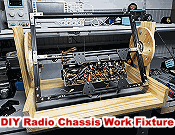 RF Cafe website visitor and frequent contributor
Bob Davis just sent me a photo of an amazingly
nice fixture he made for conveniently holding a radio chassis while being worked
on. When I asked him if I could post it on the website, he prepared the construction
info and additional photos shown below. He even provided links for purchasing the
components! The first inhabitant of Bob's new radio chassis work fixture was his
Zenith Model 6S511 superheterodyne, 6-tube AM broadcast / shortwave radio. It came
out in 1941, which means it was one of the last new radio models manufactured until
the end of World War II (1945), since radio companies were required to dedicate
facilities for... RF Cafe website visitor and frequent contributor
Bob Davis just sent me a photo of an amazingly
nice fixture he made for conveniently holding a radio chassis while being worked
on. When I asked him if I could post it on the website, he prepared the construction
info and additional photos shown below. He even provided links for purchasing the
components! The first inhabitant of Bob's new radio chassis work fixture was his
Zenith Model 6S511 superheterodyne, 6-tube AM broadcast / shortwave radio. It came
out in 1941, which means it was one of the last new radio models manufactured until
the end of World War II (1945), since radio companies were required to dedicate
facilities for...
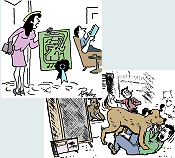 These two
tech-themed comics from the September 1969 issue of Electronics World
magazine are pretty good. I especially like the one where the guy's wife entered
his printed circuit board layout in an art contest. PCBs were just starting to gain
momentum in production electronics as they replaced the old point-to-point wiring
method. Also popular in that era was high fidelity stereo equipment. Owning a system
with speakers that operated from 1 Hz through 30 to 40 kHz was major evidence
of an audiophile's technical savvy, even though the human ear con only detect frequencies
in the 30 Hz to 20 kHz range. Dogs can hear frequencies up into the 45 kHz
range... These two
tech-themed comics from the September 1969 issue of Electronics World
magazine are pretty good. I especially like the one where the guy's wife entered
his printed circuit board layout in an art contest. PCBs were just starting to gain
momentum in production electronics as they replaced the old point-to-point wiring
method. Also popular in that era was high fidelity stereo equipment. Owning a system
with speakers that operated from 1 Hz through 30 to 40 kHz was major evidence
of an audiophile's technical savvy, even though the human ear con only detect frequencies
in the 30 Hz to 20 kHz range. Dogs can hear frequencies up into the 45 kHz
range...
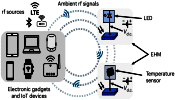 This is new? "Ubiquitous wireless technologies
like Wi-Fi, Bluetooth, and 5G rely on radio frequency (RF) signals to send and receive
data. A new prototype of an energy harvesting module—developed by a team led by
scientists from the National University of Singapore (NUS) - can now convert ambient
or
'waste' RF signals into direct current (DC) voltage. This can be used to power
small electronic devices without the use of batteries. RF energy harvesting technologies,
such as this, are essential as they reduce battery dependency, extend device lifetimes,
minimize environmental impact, and enhance the feasibility of wireless sensor..." This is new? "Ubiquitous wireless technologies
like Wi-Fi, Bluetooth, and 5G rely on radio frequency (RF) signals to send and receive
data. A new prototype of an energy harvesting module—developed by a team led by
scientists from the National University of Singapore (NUS) - can now convert ambient
or
'waste' RF signals into direct current (DC) voltage. This can be used to power
small electronic devices without the use of batteries. RF energy harvesting technologies,
such as this, are essential as they reduce battery dependency, extend device lifetimes,
minimize environmental impact, and enhance the feasibility of wireless sensor..."
 In 1960 when this article appeared in
Popular Electronics magazine, futurists were predicting that within 10
years it would be possible to beam television signals between continents and directly
into homes. It was the eve of
Project Echo, which boosted a 100-foot-diameter inflatable metallized plastic
ball into low Earth orbit to reflect signals efficiently back through the atmosphere.
Engineers and scientists were already planning the next best thing - a satellite
that not only reflected, but also amplified, possibly frequency converted, and would
even steer signals that impinge upon it. Envisioned in this article is hundreds
of satellites being available for relaying signals between all regions of the Earth
on then-standard VHF channels. We now have successful... In 1960 when this article appeared in
Popular Electronics magazine, futurists were predicting that within 10
years it would be possible to beam television signals between continents and directly
into homes. It was the eve of
Project Echo, which boosted a 100-foot-diameter inflatable metallized plastic
ball into low Earth orbit to reflect signals efficiently back through the atmosphere.
Engineers and scientists were already planning the next best thing - a satellite
that not only reflected, but also amplified, possibly frequency converted, and would
even steer signals that impinge upon it. Envisioned in this article is hundreds
of satellites being available for relaying signals between all regions of the Earth
on then-standard VHF channels. We now have successful...
 RF Cascade Workbook is the next phase in the evolution of RF Cafe's long-running
series, RF Cascade Workbook. Chances are you have never used a spreadsheet
quite like this (click
here for screen capture). It is a full-featured RF system cascade parameter
and frequency planner that includes filters and mixers for a mere $45. Built in
MS Excel, using RF Cascade Workbook is a cinch and the format
is entirely customizable. It is significantly easier and faster than using a multi-thousand
dollar simulator when a high level system analysis is all that is needed...
RF Cascade Workbook is the next phase in the evolution of RF Cafe's long-running
series, RF Cascade Workbook. Chances are you have never used a spreadsheet
quite like this (click
here for screen capture). It is a full-featured RF system cascade parameter
and frequency planner that includes filters and mixers for a mere $45. Built in
MS Excel, using RF Cascade Workbook is a cinch and the format
is entirely customizable. It is significantly easier and faster than using a multi-thousand
dollar simulator when a high level system analysis is all that is needed...
Monday the 5th
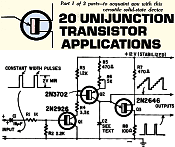 Unijunction transistors (UJT) were relatively
new semiconductor devices in 1968 when this article appeared in Radio-Electronics
magazine. Of course for that matter most semiconductor devices were still relatively
new then. Some commercial products were still being made with vacuum tubes. The
"transistor" part of the name is somewhat of a misnomer due to its physical construction,
in that there is no rectifying PN junction between the two bases, only a single
PN junction (emitter) embedded part-way into the channel between the device's two
"base" connections. There is no collector. The UJT is sometimes referred to as a
double-based diode, although there is no PN junction separating the two base connections.
It usefulness lies primarily in a negative resistance region... Unijunction transistors (UJT) were relatively
new semiconductor devices in 1968 when this article appeared in Radio-Electronics
magazine. Of course for that matter most semiconductor devices were still relatively
new then. Some commercial products were still being made with vacuum tubes. The
"transistor" part of the name is somewhat of a misnomer due to its physical construction,
in that there is no rectifying PN junction between the two bases, only a single
PN junction (emitter) embedded part-way into the channel between the device's two
"base" connections. There is no collector. The UJT is sometimes referred to as a
double-based diode, although there is no PN junction separating the two base connections.
It usefulness lies primarily in a negative resistance region...
 An iconoscope was an early form of television
image capturing tube. Some amateur radio operators were experimenting with
slow scan TV
even back when the technology was relatively new to the world. When this article
was written in 1944, there were still large portions of the United States that did
not have television broadcast coverage. Of course I would argue that at the time
of my growing up in the 1960s and early 1970s a lot of areas - even suburbs - were
still not covered by TV signals, based on how cruddy the reception at my parents'
house was. But I digress. The article mentions that because of the lack of TV coverage,
many amateurs did not even have television... An iconoscope was an early form of television
image capturing tube. Some amateur radio operators were experimenting with
slow scan TV
even back when the technology was relatively new to the world. When this article
was written in 1944, there were still large portions of the United States that did
not have television broadcast coverage. Of course I would argue that at the time
of my growing up in the 1960s and early 1970s a lot of areas - even suburbs - were
still not covered by TV signals, based on how cruddy the reception at my parents'
house was. But I digress. The article mentions that because of the lack of TV coverage,
many amateurs did not even have television...
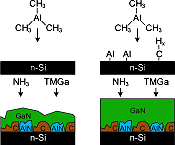 "École Polytechnique Fédérale de Lausanne
(EPFL) in Switzerland claims the first demonstration of direct growth of gallium
nitride (GaN) at high temperature on silicon (Si) substrates simply by using a trimethyl-aluminium
(TMAl) preflow, without any intentional AlN buffer. Among the benefits of the process
could be the realization of 'more efficient fully
vertical GaN-on-Si devices, in which the silicon substrate may become a functional
part of the device, as well as novel devices that require effective current conduction
to the substrate,' according to the team. Vertical current flow diode/transistor
devices are particularly sought for power electronics, and the GaN/Si combination..." "École Polytechnique Fédérale de Lausanne
(EPFL) in Switzerland claims the first demonstration of direct growth of gallium
nitride (GaN) at high temperature on silicon (Si) substrates simply by using a trimethyl-aluminium
(TMAl) preflow, without any intentional AlN buffer. Among the benefits of the process
could be the realization of 'more efficient fully
vertical GaN-on-Si devices, in which the silicon substrate may become a functional
part of the device, as well as novel devices that require effective current conduction
to the substrate,' according to the team. Vertical current flow diode/transistor
devices are particularly sought for power electronics, and the GaN/Si combination..."
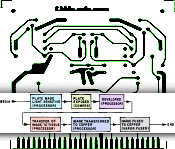 The October 1969 issue of Electronics
World magazine contained no fewer than nine separate articles on the relatively
new technology of
printed circuit boards (PCBs). Through the mid 1960s, many, if not most, electronic
assemblies used all point-to-point wiring connections, or a majority of point-to-point
with a minor circuit or two on a PCB. Multilayer PCBs were being routinely manufactured
for defense and aerospace applications, but more than two or three layers was a
rarity in an AM/FM radio, television, or smart appliance (just kidding about the
last one). This "dry process" for PCBs, costing $6k ($41k in 2017 dollars), was
pitched as a low cost method for manufacturing small volume boards... The October 1969 issue of Electronics
World magazine contained no fewer than nine separate articles on the relatively
new technology of
printed circuit boards (PCBs). Through the mid 1960s, many, if not most, electronic
assemblies used all point-to-point wiring connections, or a majority of point-to-point
with a minor circuit or two on a PCB. Multilayer PCBs were being routinely manufactured
for defense and aerospace applications, but more than two or three layers was a
rarity in an AM/FM radio, television, or smart appliance (just kidding about the
last one). This "dry process" for PCBs, costing $6k ($41k in 2017 dollars), was
pitched as a low cost method for manufacturing small volume boards...
 Axiom Test Equipment, a Transcat company,
allows you to rent or
buy
test equipment, repair
test equipment, or
sell or trade test equipment. They are committed to providing superior customer
service and high quality electronic test equipment. Axiom offers customers several
practical, efficient, and cost effective solutions for their projects' TE needs
and is committed to providing superior customer service and high quality electronic
test equipment. For anyone seeking a way to offload surplus or obsolete equipment,
they offer a trade-in program or they will buy the equipment from you. Some vintage
items are available fully calibrated. Please check out Axiom Test Equipment today
- and don't miss the blog articles! Axiom Test Equipment, a Transcat company,
allows you to rent or
buy
test equipment, repair
test equipment, or
sell or trade test equipment. They are committed to providing superior customer
service and high quality electronic test equipment. Axiom offers customers several
practical, efficient, and cost effective solutions for their projects' TE needs
and is committed to providing superior customer service and high quality electronic
test equipment. For anyone seeking a way to offload surplus or obsolete equipment,
they offer a trade-in program or they will buy the equipment from you. Some vintage
items are available fully calibrated. Please check out Axiom Test Equipment today
- and don't miss the blog articles!
 With more than 1000
custom-built stencils, this has got to be the most comprehensive set of
Visio Stencils
available for RF, analog, and digital system and schematic drawings! Every stencil
symbol has been built to fit proportionally on the included A-, B-, and C-size drawing
page templates (or use your own page if preferred). Components are provided for
system block diagrams, conceptual drawings, schematics, test equipment, racks, and
more. Page templates are provided with a preset scale (changeable) for a good presentation
that can incorporate all provided symbols... With more than 1000
custom-built stencils, this has got to be the most comprehensive set of
Visio Stencils
available for RF, analog, and digital system and schematic drawings! Every stencil
symbol has been built to fit proportionally on the included A-, B-, and C-size drawing
page templates (or use your own page if preferred). Components are provided for
system block diagrams, conceptual drawings, schematics, test equipment, racks, and
more. Page templates are provided with a preset scale (changeable) for a good presentation
that can incorporate all provided symbols...
Friday the 2nd
 Wind down your workweek with this triplet
of
electronics-related comics from a 1960 issue of Radio-Electronics magazine.
There are still plenty of us around who understand the page 78 comic. We are the
generation(s) who sometimes needed to reach around to the back of the TV set and
twist the vertical hold potentiometer to get the picture to stop climbing up or
down the screen. The incredible feature of the comic is that the frame split appears
to show the upper half of a man and the lower half of a woman in the same frame.
Because of the structure and processing of the video signal signal, it would not
have been due to parts of two noncontiguous frames or two separate channels. If
you don't understand what I'm saying, it's because you weren't "there." Out of morbid
curiosity... Wind down your workweek with this triplet
of
electronics-related comics from a 1960 issue of Radio-Electronics magazine.
There are still plenty of us around who understand the page 78 comic. We are the
generation(s) who sometimes needed to reach around to the back of the TV set and
twist the vertical hold potentiometer to get the picture to stop climbing up or
down the screen. The incredible feature of the comic is that the frame split appears
to show the upper half of a man and the lower half of a woman in the same frame.
Because of the structure and processing of the video signal signal, it would not
have been due to parts of two noncontiguous frames or two separate channels. If
you don't understand what I'm saying, it's because you weren't "there." Out of morbid
curiosity...
 Before there were vacuum tube and semiconductor
diodes for use as RF signal detectors, there was the
coherer. This article by Henry Davis in the May 1967 Popular Electronics
magazine discusses the invention of the coherer by Dr. Edouard Branley. Dr. Branley's
work was, as is often the case for the ultimate inventors of a new apparatus or
process, based on predecessors who over time pieced together the puzzle of electromagnetic
energy and its effects on objects located some distance from the source. Coherers
rely on relatively strong, broadband energy like that emitted from the early spark
gap transmitters in order to function; both being extremely crude methods compared
to modern techniques... Before there were vacuum tube and semiconductor
diodes for use as RF signal detectors, there was the
coherer. This article by Henry Davis in the May 1967 Popular Electronics
magazine discusses the invention of the coherer by Dr. Edouard Branley. Dr. Branley's
work was, as is often the case for the ultimate inventors of a new apparatus or
process, based on predecessors who over time pieced together the puzzle of electromagnetic
energy and its effects on objects located some distance from the source. Coherers
rely on relatively strong, broadband energy like that emitted from the early spark
gap transmitters in order to function; both being extremely crude methods compared
to modern techniques...
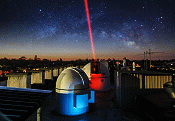 ""The University of Western Australia's
TeraNet, a network of optical ground stations specializing in high-speed space communications,
has successfully received laser signals from a German satellite in low Earth orbit.
This breakthrough paves the way for a
1,000-fold increase in communication bandwidth between space and Earth. TeraNet's
laser communication test with OSIRISv1 marks a step towards replacing outdated radio
systems with high-speed lasers for space communications in Western Australia..." ""The University of Western Australia's
TeraNet, a network of optical ground stations specializing in high-speed space communications,
has successfully received laser signals from a German satellite in low Earth orbit.
This breakthrough paves the way for a
1,000-fold increase in communication bandwidth between space and Earth. TeraNet's
laser communication test with OSIRISv1 marks a step towards replacing outdated radio
systems with high-speed lasers for space communications in Western Australia..."
• Canada
Steps up Semiconductor Investment
• ARRL on The
Weather Channel
• GlobalWafers Gets
$400M Chips Act Subsidy
• Silicon 100:
Startups
Worth Watching in 2024
• PCs
Have 2nd Quarter of Growth
 The April 1969 issue of Electronics World
magazine included a large number of articles on the topic of filter design and use.
Included were titles such as "LC Filters," "Practical Operating Limits for Filters,"
"Filters for Microwave," "Crystal Filters," and others which were contributed by
experts in the field from industry and academia. Check the table of contents to
see which ones have been posted here. This piece on the use of
ferrite beads for blocking RF signals is more of a sidebar note than an article,
but it's still worthy of inclusion. Ferrite beads and toroids are still widely employed
for stopping radio frequency interference (RFI) on everything from AC... The April 1969 issue of Electronics World
magazine included a large number of articles on the topic of filter design and use.
Included were titles such as "LC Filters," "Practical Operating Limits for Filters,"
"Filters for Microwave," "Crystal Filters," and others which were contributed by
experts in the field from industry and academia. Check the table of contents to
see which ones have been posted here. This piece on the use of
ferrite beads for blocking RF signals is more of a sidebar note than an article,
but it's still worthy of inclusion. Ferrite beads and toroids are still widely employed
for stopping radio frequency interference (RFI) on everything from AC...
 Anritsu has been a global provider of innovative
communications test and measurement solutions for more than 120 years. Anritsu manufactures
a full line of innovative components and accessories for
RF and Microwave Test and Measurement
Equipment including attenuators & terminations; coaxial cables, connectors &
adapters; o-scopes; power meters & sensors; signal generators; antenna, signal,
spectrum, & vector network analyzers (VNAs); calibration kits; Bluetooth &
WLAN testers; PIM testers; amplifiers; power dividers; antennas. "We've Got You
Covered." Anritsu has been a global provider of innovative
communications test and measurement solutions for more than 120 years. Anritsu manufactures
a full line of innovative components and accessories for
RF and Microwave Test and Measurement
Equipment including attenuators & terminations; coaxial cables, connectors &
adapters; o-scopes; power meters & sensors; signal generators; antenna, signal,
spectrum, & vector network analyzers (VNAs); calibration kits; Bluetooth &
WLAN testers; PIM testers; amplifiers; power dividers; antennas. "We've Got You
Covered."
 Banner Ads are rotated in all locations
on the page! RF Cafe typically receives 8,000-15,000 visits each
weekday. RF Cafe
is a favorite of engineers, technicians, hobbyists, and students all over the world.
With more than 17,000 pages in the Google search index, RF Cafe returns in
favorable positions on many types of key searches, both for text and images.
Your Banner Ads are displayed on average0,000 times per year! New content
is added on a daily basis, which keeps the major search engines interested enough
to spider it multiple times each day. Items added on the homepage often can be found
in a Google search within a few hours of being posted. If you need your company
news to be seen, RF Cafe is the place to be... Banner Ads are rotated in all locations
on the page! RF Cafe typically receives 8,000-15,000 visits each
weekday. RF Cafe
is a favorite of engineers, technicians, hobbyists, and students all over the world.
With more than 17,000 pages in the Google search index, RF Cafe returns in
favorable positions on many types of key searches, both for text and images.
Your Banner Ads are displayed on average0,000 times per year! New content
is added on a daily basis, which keeps the major search engines interested enough
to spider it multiple times each day. Items added on the homepage often can be found
in a Google search within a few hours of being posted. If you need your company
news to be seen, RF Cafe is the place to be...
Thursday the 1st
 Field service of electronic products like
radios, televisions, and even tape recorders/players and phonographs, was still
a common thing in 1961 when this promotion appeared in Radio-Electronics
magazine. Those assemblies had a lot of parts, most of which no two were the same.
That is the nature of analog circuits containing multiple stages of varying gains,
frequencies, and voltage / current / power levels. Stocking and carrying a kit of
replacement parts likely to be exact replacements or suitable substitutes for factory
parts was imperative for efficient and profitable business. Many component companies
were supplying kits like this one featuring coils (inductors) for TV tuners from
Standard Kollsman Industries. Similar kits existed for resistors, capacitors,
vacuum tubes, transformers, dial lamps, switches, mechanical hardware, etc... Field service of electronic products like
radios, televisions, and even tape recorders/players and phonographs, was still
a common thing in 1961 when this promotion appeared in Radio-Electronics
magazine. Those assemblies had a lot of parts, most of which no two were the same.
That is the nature of analog circuits containing multiple stages of varying gains,
frequencies, and voltage / current / power levels. Stocking and carrying a kit of
replacement parts likely to be exact replacements or suitable substitutes for factory
parts was imperative for efficient and profitable business. Many component companies
were supplying kits like this one featuring coils (inductors) for TV tuners from
Standard Kollsman Industries. Similar kits existed for resistors, capacitors,
vacuum tubes, transformers, dial lamps, switches, mechanical hardware, etc...
 Exodus Advanced Communications is a multinational
RF communication equipment and engineering service company serving both commercial
and government entities and their affiliates worldwide. Power amplifiers ranging
from 10 kHz to 51 GHz with various output power levels and noise figure
ranges, we fully support custom designs and manufacturing requirements for both
small and large volume levels. decades of combined experience in the RF field for
numerous applications including military jamming, communications, radar, EMI/EMC
and various commercial projects with all designing and manufacturing of our HPA,
MPA, and LNA products in-house. Exodus Advanced Communications is a multinational
RF communication equipment and engineering service company serving both commercial
and government entities and their affiliates worldwide. Power amplifiers ranging
from 10 kHz to 51 GHz with various output power levels and noise figure
ranges, we fully support custom designs and manufacturing requirements for both
small and large volume levels. decades of combined experience in the RF field for
numerous applications including military jamming, communications, radar, EMI/EMC
and various commercial projects with all designing and manufacturing of our HPA,
MPA, and LNA products in-house.
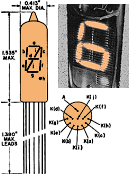 You might have heard of Pixie tubes and
Nixie tubes from the era preceding light emitting diodes (LED's), but how about
Elfin tubes? They were considered the next stage in the evolution of digital
display devices. This article from a 1969 issue of Radio-Electronics magazine
provides an introduction to Elfin tubes. The images above are from a listing on
eBay offering to sell MG-19B Elfin Readout tubes for $10 each, in case you want
one for a conversation piece or for a project. Elfin tubes are fairly accessible
if this guy depletes his supply. I grabbed a shot of the tube and datasheet in case
they disappear someday... You might have heard of Pixie tubes and
Nixie tubes from the era preceding light emitting diodes (LED's), but how about
Elfin tubes? They were considered the next stage in the evolution of digital
display devices. This article from a 1969 issue of Radio-Electronics magazine
provides an introduction to Elfin tubes. The images above are from a listing on
eBay offering to sell MG-19B Elfin Readout tubes for $10 each, in case you want
one for a conversation piece or for a project. Elfin tubes are fairly accessible
if this guy depletes his supply. I grabbed a shot of the tube and datasheet in case
they disappear someday...
 Werbel Microwave's WMRD02-7.2-S is a
2-way resistive power splitter / combiner that covers from DC to 7.2 GHz
with ultra-wide bandwidth. This unique design accomplishes extremely flat frequency
response in a small radial package. Our unique design approach provides higher than
expected isolation between outputs at far ports than would be achieved in a typical
star topology. It has applications in markets such as CATV, test and measurement,
and military radio. Its small size makes it easy to integrate into compact systems.
Designed, assembled, and tested in the USA. Werbel Microwave's WMRD02-7.2-S is a
2-way resistive power splitter / combiner that covers from DC to 7.2 GHz
with ultra-wide bandwidth. This unique design accomplishes extremely flat frequency
response in a small radial package. Our unique design approach provides higher than
expected isolation between outputs at far ports than would be achieved in a typical
star topology. It has applications in markets such as CATV, test and measurement,
and military radio. Its small size makes it easy to integrate into compact systems.
Designed, assembled, and tested in the USA.
 Uh-oh, I'd better issue a sensitivity warning
before going on, because this 1969 Electronics World magazine article reports
on
electrocution data gathered via empirical testing that demonstrates a difference
between men and women, especially since men fared better. Charles Dalziel, inventor
of the ground fault interrupter (GFI) circuit, subjected men and women to increasing
electrical current levels to determine how much each could take and still be able
to release the small wire carrying the shocking current to their hands. The average
"let-go current" was found to be 16 mA for men and 10.5 mA for women.
Clearly sexism is present somewhere... Uh-oh, I'd better issue a sensitivity warning
before going on, because this 1969 Electronics World magazine article reports
on
electrocution data gathered via empirical testing that demonstrates a difference
between men and women, especially since men fared better. Charles Dalziel, inventor
of the ground fault interrupter (GFI) circuit, subjected men and women to increasing
electrical current levels to determine how much each could take and still be able
to release the small wire carrying the shocking current to their hands. The average
"let-go current" was found to be 16 mA for men and 10.5 mA for women.
Clearly sexism is present somewhere...
 With more than 1000
custom-built stencils, this has got to be the most comprehensive set of
Visio Stencils
available for RF, analog, and digital system and schematic drawings! Every stencil
symbol has been built to fit proportionally on the included A-, B-, and C-size drawing
page templates (or use your own page if preferred). Components are provided for
system block diagrams, conceptual drawings, schematics, test equipment, racks, and
more. Page templates are provided with a preset scale (changeable) for a good presentation
that can incorporate all provided symbols... With more than 1000
custom-built stencils, this has got to be the most comprehensive set of
Visio Stencils
available for RF, analog, and digital system and schematic drawings! Every stencil
symbol has been built to fit proportionally on the included A-, B-, and C-size drawing
page templates (or use your own page if preferred). Components are provided for
system block diagrams, conceptual drawings, schematics, test equipment, racks, and
more. Page templates are provided with a preset scale (changeable) for a good presentation
that can incorporate all provided symbols...
 Since 1996, ISOTEC has designed, developed
and manufactured an extensive line of RF/microwave
connectors, between-series adapters, RF components and filters for wireless
service providers including non-magnetic connectors for quantum computing and MRI
equipments etc. ISOTEC's product line includes low-PIM RF connectors components
such as power dividers and directional couplers. Off-the-shelf and customized products
up to 40 GHz and our low-PIM products can meet -160 dBc with 2 tones and
20 W test. Quick prototyping, advanced in-house testing and high-performance.
Designs that are cost effective practical and repeatable. Since 1996, ISOTEC has designed, developed
and manufactured an extensive line of RF/microwave
connectors, between-series adapters, RF components and filters for wireless
service providers including non-magnetic connectors for quantum computing and MRI
equipments etc. ISOTEC's product line includes low-PIM RF connectors components
such as power dividers and directional couplers. Off-the-shelf and customized products
up to 40 GHz and our low-PIM products can meet -160 dBc with 2 tones and
20 W test. Quick prototyping, advanced in-house testing and high-performance.
Designs that are cost effective practical and repeatable.
These archive pages are provided in order to make it easier for you to find items
that you remember seeing on the RF Cafe homepage. Of course probably the easiest
way to find anything on the website is to use the "Search
RF Cafe" box at the top of every page. Some quoted items have been shortened
to save space. About RF Cafe.
Homepage Archive Pages
2026:
Jan |
Feb | Mar | Apr | May | Jun | Jul | Aug
| Sep | Oct | Nov | Dec
2025:
Jan |
Feb |
Mar |
Apr |
May |
Jun |
Jul |
Aug |
Sep |
Oct |
Nov |
Dec
2024:
Jan |
Feb |
Mar |
Apr |
May |
Jun |
Jul |
Aug |
Sep |
Oct |
Nov |
Dec
2023:
Jan |
Feb |
Mar |
Apr |
May |
Jun |
Jul |
Aug |
Sep |
Oct |
Nov |
Dec
2022:
Jan |
Feb |
Mar |
Apr |
May |
Jun |
Jul |
Aug |
Sep |
Oct |
Nov |
Dec
2021:
Jan |
Feb |
Mar |
Apr |
May |
Jun |
Jul |
Aug |
Sep |
Oct |
Nov |
Dec
2020:
Jan |
Feb |
Mar |
Apr |
May |
Jun |
Jul |
Aug |
Sep |
Oct |
Nov |
Dec
2019:
Jan |
Feb |
Mar |
Apr |
May |
Jun |
Jul |
Aug |
Sep |
Oct |
Nov |
Dec
2018:
Jan |
Feb |
Mar |
Apr |
May |
Jun |
Jul |
Aug |
Sep |
Oct |
Nov |
Dec
2017:
Jan | Feb |
Mar |
Apr |
May |
Jun |
Jul |
Aug |
Sep |
Oct |
Nov |
Dec
2016:
Jan | Feb |
Mar |
Apr |
May |
Jun |
Jul |
Aug |
Sep |
Oct |
Nov |
Dec
2015:
Jan | Feb |
Mar |
Apr |
May |
Jun |
Jul |
Aug | Sep |
Oct |
Nov |
Dec
2014:
Jan | Feb |
Mar |
Apr |
May |
Jun |
Jul |
Aug |
Sep |
Oct |
Nov |
Dec
2013:
Jan | Feb |
Mar |
Apr |
May |
Jun |
Jul |
Aug |
Sep |
Oct |
Nov |
Dec
2012: 1 |
2 | 3
| 4 | 5
| 6 | 7
| 8 | 9
| 10 | 11
| 12 | 13
(no archives before 2012)
- Christmas-themed
items
|















 Unijunction transistors (UJT)
Unijunction transistors (UJT)









 Exodus Advanced Communications
Exodus Advanced Communications






